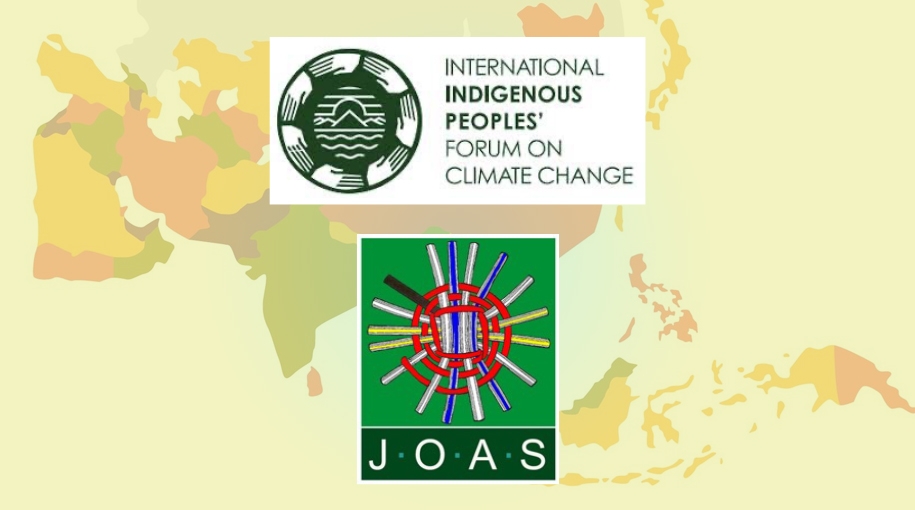We acknowledge the original peoples of Johor on whose land we gather this week. We stand in solidarity with the Orang Asal, particularly the Orang Asli in Peninsular Malaysia, who have been continuously marginalized and excluded in decision-making processes and most of whom are unable to join in person today.
The International Indigenous Peoples Forum on Climate Change in Asia, which consists of over 50 Indigenous representatives from 7 countries in Asia at the Asia-Pacific Climate Week, would like to remind State Parties of their commitments in implementing climate actions to be based on human rights, including Indigenous Peoples’ rights as enshrined in the UN Declaration on the Rights of Indigenous Peoples in achieving the target of less than 1.5 degree Celsius.
We assert the need to engage Indigenous Peoples here in Malaysia, as it should be in all other countries in Asia and all over the world, as key partners and not as mere beneficiaries as we have been treated for the longest time in the climate dialogue. All climate decisions and actions must take into account priorities and needs of Indigenous Peoples, giving special emphasis on the experience of Indigenous women, Indigenous youth and children, persons with disabilities, and our gender-diverse relatives. The contributions of our traditional knowledge in adaptation, mitigation and even in responding to loss and damage must be recognized and supported.
While reports from countries indicate an increase in global flow of climate finance, Indigenous Peoples have received hardly anything (or only 1% of the average finance for mitigation and adaptation through Overseas Development Assistance from 2011-2020). This is unacceptable and we demand for data on Indigenous Peoples’ direct access to climate finance in the Global Stocktake and mechanisms for direct access to climate finance for Indigenous Peoples, including in the Loss and Damage Fund. Both appropriate technologies and adequate, sustainable and predictable financing will help us continue our role as stewards of the remaining biodiversity in the world that is crucial to the solution of this climate emergency.
The Loss and Damage Fund must ensure full and effective participation of Indigenous Peoples by providing a distinct seat for Indigenous Peoples and operationalizing a programme for direct access financing.
Adaptation, including in the negotiation of the Global Goal, must ethically and equitably engage with Indigenous knowledge systems, sciences, and ways of knowing and being to prevent maladaptation and violations of our rights.
In mitigation, real reductions of greenhouse gasses must be done at the source and states must ensure that the green energy transition does not recreate the removal, dispossession, and criminalization that Indigenous Peoples have faced in the current energy system.
Despite the vast potential of renewable energy sources in the region, hundreds of Indigenous communities still lack access to energy, while large-scale projects like wind farms, solar energy farms and hydropower initiatives, are imposed on Indigenous Peoples without their Free Prior and Informed Consent, often resulting in detrimental effects. Rather than catering to the needs of Indigenous communities, these projects primarily serve urban areas, industries, tourism, and businesses. Addressing this energy access disparity requires urgent action, involving adequate financing, capacity building, transfer of technology to strengthen Indigenous led-initiatives and partnerships with Indigenous communities to ensure their meaningful participation in the planning and management of energy projects aligned with their needs and aspirations. Emphasizing community-led renewable energy initiatives is crucial to prevent Indigenous communities from being marginalized in fulfilling their energy requirements.
The growing demand for clean technologies is fueling increased extraction of critical minerals, compounding already existing threats that Indigenous Peoples face in their territories. This approach to decarbonization is creating a new form of climate change threat, as it encourages extractivism which destroys biodiversity and adversely impacts Indigenous Peoples’ lives and livelihoods.
This week, we have observed the increased interest and push by governments and the private sector to engage in nature-based solutions, specifically the carbon market. This is concerning for us, Indigenous Peoples, as we believe that this is another form of colonization. Much remains to be understood regarding carbon markets.
We therefore call for a moratorium on all carbon trading activities in the region until Indigenous Peoples’ rights to their lands and resources are fully recognised and respected, including the right to Free, Prior, and Informed Consent.
We call for a review of many initiatives that are being implemented in the name of just energy transition and/or conservation for climate solutions. According to the violations reported to Front Line Defenders in 2022, Indigenous Peoples and environmental human rights defenders (EHRDs) were the most targeted groups, with arrest and detention, and legal action recorded as the most prominent forms of violations. While comprehensive data of the attacks against EHRDs in Asia Pacific is limited, Forum Asia documented 1,217 violations committed against HRDs in 21 monitored Asian countries from 1 January 2021 to 30 June 2022 and recorded 112 violations against EHRDs in the South East Asia subregion.
We call for the governments in the Asia-Pacific region for the protection of all environmental, human and Indigenous rights defenders who continue to be criminalized in their struggle to fight for their rights to land and their resources, which are plundered purportedly as climate solutions.
We call for a continuous capacity strengthening of both Indigenous Peoples, to be able to engage meaningfully in climate change negotiation spaces, and of governments and other partner agencies to understand the context and rights of Indigenous Peoples.
In closing, we recall the words of an Orang Asli elder, Tijah Yok Chopil, “Climate solutions can be found in the wisdom of the people of the land, in including Indigenous Peoples in these processes, we not only ensure sustainable climate solutions but we are also ensuring the survival of the earth we all call home. Climate change can only be addressed through real and equitable partnerships”.
Terima kasih.


